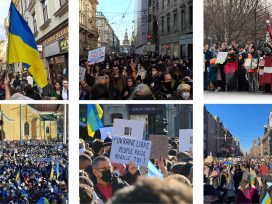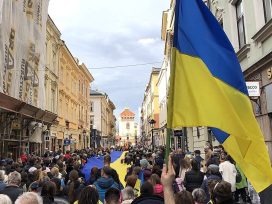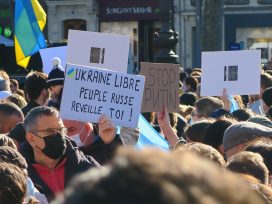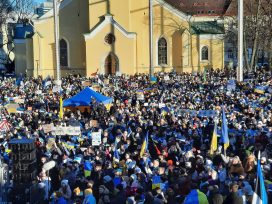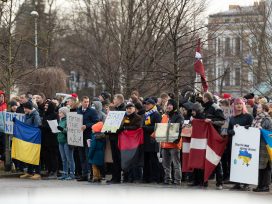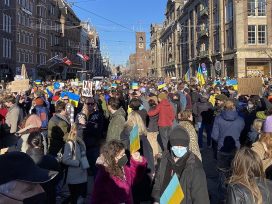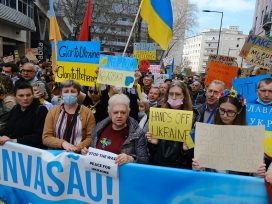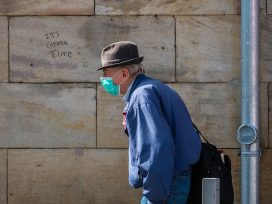Introducing a series on the implications of Russia’s war on Ukraine for the future of the European Union, Eurozine co-founders Carl Henrik Fredriksson and Klaus Nellen contrast Europe’s response today with opposition to the Iraq invasion in 2003.
Twenty years ago, on 31 May 2003, Jürgen Habermas, supported by Jacques Derrida and accompanied by other leading intellectuals, launched an ambitious initiative for the creation of a European public sphere. This, they argued, would precipitate a thorough renewal of the EU and the emergence of a common European identity. In German the venture bore the title Nach dem Krieg: Die Wiedergeburt Europas – ‘After the war: The rebirth of Europe’.
The impetus for Habermas’s appeal, which was published in both the Frankfurter Allgemeine Zeitung and Libération, was a specific historical constellation: in spring 2003, huge crowds had gathered in European capitals to protest against the US-led attack on Iraq, an invasion in violation of international law. These were the largest public demonstrations since the end of World War II. At the same time, the Iraq war had made Europeans painfully aware of their own failure to form a common foreign policy and had sparked a dispute about the future world order.
In this situation, noted Habermas, Europe was predestined to exert its influence in shaping a ‘coming global domestic policy’. The old continent’s historical experience obliged it to show ‘that in a complex world society, it is not just divisions that count, but also the soft power of negotiating agendas, relations, and economic advantages. In this world, the reduction of politics to the stupid and costly alternative of war or peace simply doesn’t pay.’
Today, it has become agonizingly clear that the vision of Europe conceived by Habermas was never realized. But perhaps something can be learned from his attempt. Its failure had several reasons. Most importantly, the whole initiative suffered from a hypostatization of ‘core Europe’, resulting in the almost complete omission of the perspective of the new EU members in the east – as if 1989 had never happened. In May 2003, the enlargement was already long decided and in less than a year after the publication of Habermas’s article, Hungary, Poland, Slovakia, Slovenia, the Czech Republic and the three Baltic states all joined the Union. In Habermas’s appeal, however, they were all conspicuous by their absence.
This major blind spot resulted in further misreadings of the situation. For example, the presumption that democracy could do without hard power, which – as has become clear today – allowed Russia to pursue its imperial ambitions unhindered. Or the belief that the main obstacle to a reasonable world order was the ‘hegemonic unilateralism’ of the US, and that a European identity had to be formulated in stark opposition to America.Habermas was convinced that we, at least we Europeans, lived in post-bellum times – ‘After the war’, as the title of the manifesto read. Even when, two decades later in April 2022, he published his first reflections on Russia’s full-scale invasion of Ukraine, Habermas started by noting that the attack had happened ‘after 77 years without war’. That phrase was later changed in the web version of the article, but the initial omission of the Yugoslav wars of the 1990s, the Russo-Georgian war in 2008 or, indeed, the start of the Russo-Ukrainian war in Crimea and Donbas in 2014, spoke volumes. For Habermas, Europe is a post-bellum project. For him – as for most western Europeans, not least the Germans – economic interdependence would inevitably prevent major military conflict, now and in the future. Ever deeper economic and political integration on the inside, and Wandel durch Handel, change through trade, on the outside was the way forward.
Twenty years on, we are confronted with a war that brutally demonstrates the limits of Europe’s soft power. Russian aggression poses at least as great a threat to a peaceful world order as the Iraq war did back then. Russia’s war on and in Ukraine not only violates international law but is also directly aimed against Europe and the West as a community of values.
At the same time Europe, despite all its internal tensions and fault lines, has reacted to Russia’s aggression with astonishing solidarity, ranging from refugee policy and economic sanctions to arms deliveries. And in this stance it has been unreservedly supported by the United States. Europe and the rest of the West stand united – at least for now.
Instead of interdependence, energy independence has become an outspoken goal. Instead of ever closer integration of a few ‘core’ European countries, further EU enlargement is back on the agenda – not only as an economic and social objective, but as a security measure, so as to achieve long-term stability in an increasingly volatile geopolitical situation. The western Balkans are in focus again, together with Ukraine and Moldova. This is unquestionably shifting the centre of gravity to the east, not only geographically but also when it comes to whose perspective is relevant and whose is not.
How should Europe deal with this radically metamorphosed constellation? It seems high time for another attempt at renewal.
With this series, we want to contribute to Europeans’ self-understanding in the face of their greatest challenge since World War II. We have asked leading public intellectuals in both western and eastern Europe, including Ukraine, to take on this challenge and reflect on the possibility of a ‘Rebirth of Europe’. Habermas’s and Derrida’s article from 2003 is in this context above all a point of departure and by no means circumscribes the intellectual approach or the issues to be addressed.
A vision of the future of Europe will not emerge from thin air but, as Habermas wrote in 2003, ‘only from the disquieting perception of perplexity’. The disorientation and vulnerability felt today are different than twenty years ago. The lessons to be learned from the ongoing war sometimes seem to point in the exact opposite direction. In any case, the need to develop a vision of what Europe is, and what it could and should become, is greater than ever.
Vienna and Björkö, July 2023
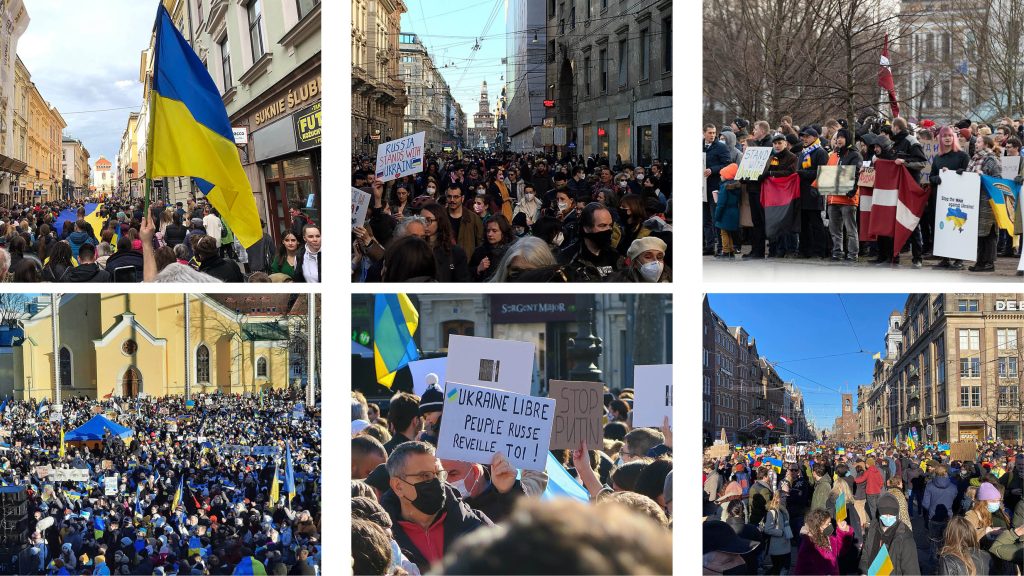
Protests in February 2022 against the Russian invasion of Ukraine in European cities (clockwise): Kraków / Franek Vetulani, CC BY-SA 4.0, via Wikimedia Commons 2: Milan / MLWatts, CC BY-SA 4.0, via Wikimedia Commons 3: Riga / Saeima, CC BY-SA 2.0, via Wikimedia Commons 4: Amsterdam / Adenosine Triphosphate, CC BY-SA 4.0, via Wikimedia Commons 5: Paris / Paola Breizh, CC BY 2.0, via Wikimedia Commons 6: Tallinn / Metsavend, CC BY-SA 4.0 via Wikimedia Commons
Published 14 July 2023
Original in English
First published by Eurozine
© Carl Henrik Fredriksson / Klaus Nellen / Eurozine
PDF/PRINTIn collaboration with
In focal points
Newsletter
Subscribe to know what’s worth thinking about.
Related Articles
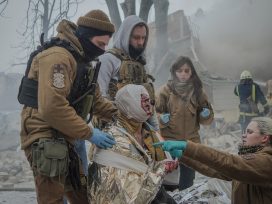
Under the aegis of the Council of Europe, a ‘core’ group of countries have been moving forward with plans for a tribunal capable of prosecuting the Russian leadership for the crime of international aggression. The US administration’s switch of allegiance now puts these plans at risk, writes Gwara Media.
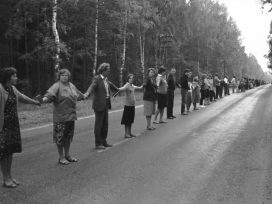
The fall of the Berlin Wall, and not the human chain across the Baltics, is emblematic of 1989. But what if this show of unity had become iconic of communism’s disintegration? Could acknowledging Eastern Europe’s liberation positively reframe what Russia otherwise perceives as loss since the Soviet Union’s demise?
